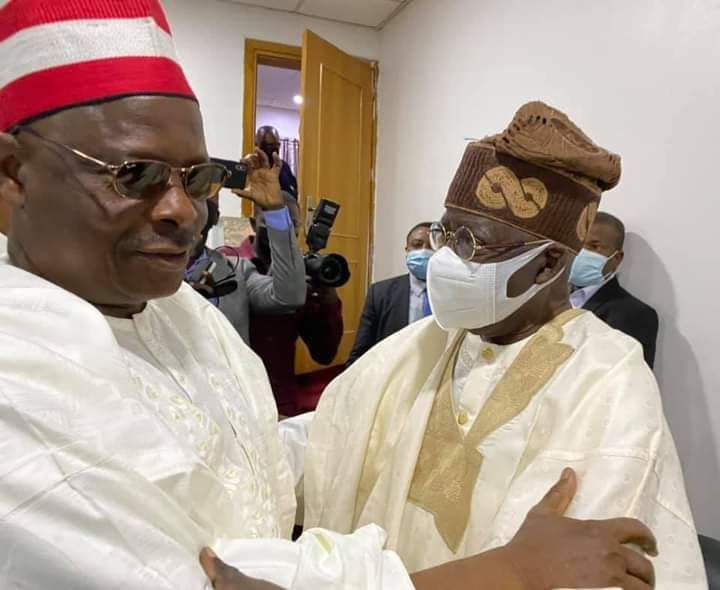But who will speak for Nigeria? [OPINION]

Kwankwaso and Tinubu
What I would call a routine conversation with a former Nigerian leader inspired this write-up. After expressing his concern about certain developments in the polity, the retired general said he was worried about how Nigerians keep promoting ethnic and religious sentiments at a time the country needed all the unity it can afford to make progress. “What really are we benefitting from playing up these sentiments on virtually every national issue that has nothing to do with ethnicity or religion?” he asked me — and I could feel and touch his despondency. Regrettably, it was not as if I had an answer to his question. All I always try to do is put a question mark on the most popular answers.
“Your Excellency,” I ventured a response, “it is a natural thing to expect in a federation of this nature where there is a fierce economic and political competition. The mutual suspicion will always be there. People often feel the need to cling to their primordial affinities on national issues because they think they will gain or lose… I am just amazed at how some people who have served in very senior national positions retreat to their ethnic cocoons when they retire. I wonder what they must have done quietly while in public office to promote their sectional agenda. People always feel the need to defend their lines… and the intense competition is turning people to ethnic champions—”
“But if we are all speaking for our ethnic groups,” he cut in, “who will speak for Nigeria?”
This conversation took place about six months ago, but it keeps coming to my mind, more so in the light of the ongoing rumpus over the tax reform bills. Most comments have been sectional and sentimental. Only very few comments are from informed positions. I have seen people from states that will benefit campaign against the reform, thinking they will lose. I have also seen people from states that will lose support the reform, thinking they will gain. Many are just following the crowd, parroting what someone from their part of the country says. The airwave is full of many protagonists and antagonists who have not studied the bills. This is the bit about us that bothers me all the time.
As I argued in an article, ‘PIA and the Triumph of Mischief’ (August 22, 2021), most of those who make initial comments on a national issue and stir long-lasting controversies often have two things in common: ignorance and mischief. These are very powerful tools for the perpetuation of underdevelopment in any country. The initial comments on the Petroleum Industry Act (PIA) were based on the wrong interpretations of “profit oil”, “profit gas” and “frontier exploration” which were portrayed as an attempt by one section to cheat the other. I started hearing statements like “this is the most anti-Niger Delta legislation in our history” despite the improved benefits for the region.
As a result, nobody was thinking about Nigeria, nobody was speaking for Nigeria. And we missed a fine detail: that the national oil company and industry regulators quietly used the PIA to corner considerable oil revenues and remit less to the federation account. A lot of the oil revenues that should go directly to the federation account and be shared by the three tiers of government are now being retained by these entities. Some agencies have become richer than many states. One even budgeted N50 billion for “welfare” for 2024. The PIA created what I would call parallel governments, depriving federating units vital revenues. But we were blindly arguing over “frontier exploration”.
A similar pattern has emerged over the tax bills. Many comments are being built along regional lines. Dr Rabiu Musa Kwankwaso, former minister of defence and former presidential candidate who wanted to lead the whole of Nigeria, said the bills are meant to colonise the north. He said taxes will be collected from Kano and sent to Lagos. But as simulated models on VAT derivation are showing, Lagos will be one of the losers while Kano will be one of the gainers. (By the way, this worries me. I live in Lagos. If the state loses huge revenue from the removal of the “headquarters factor” in VAT derivation, I am afraid the Alausa taxman will go into a revenue overdrive to make up for the loss.)
People can have sectional opinions over national issues. It is legal. However, it would be more helpful to stick to the facts. Opinion leaders should realise that their words carry weight and their followers may not have the capacity to fact-check them. The academia is not spared. I read the widely circulated position paper of a professor of accounting at the Ahmadu Bello University (ABU), one of Nigeria’s most respected academic institutions. He kept saying the new VAT derivation formula is not in the bill, even when it is stated in section 22(12) of the tax administration bill that it shall be by the location (not origin) of supplies. His position probably shaped the opinion of many northern leaders.
I got one insightful response to my article of last week. I found someone speaking for Nigeria, devoid of our dyed-in-the-wool sentiments. Please indulge me to quote him extensively: “I loved your lines about data above religious and ethnic sentiment. There is one area I wanted to point out which has not been much tackled and which this issue throws up: that’s the issue of VAT on agricultural products. If agriculture makes 25% of Nigeria’s GDP and the North makes up 94% of agro produce (according to circulating data), then the North is producing over 23% of Nigeria’s GDP. This is staggering. The issue here is VAT is not taxed on agricultural products, unlike many other countries.”
He expanded his argument thus: “The North is being deprived of 7.5% of 23% of GDP. Estimates say this could be well above between N4 trillion, based on current GDP (N240 trillion) and current food consumption levels. This is more than the total collected VAT today by all 36 states. Imagine what an extra N4 trillion could do in Northen States? I know firsthand because I am from Akwa Ibom. I saw what 13% derivation did, propelling our state from one of the poorest in the country to one of the richest almost overnight. Despite very high levels of corruption, our state leaders simply had more cash and could do more. They could build roads, bridges, airports, hotels, power plants, etc.
“At a point they even took over Federal Government responsibilities valued at hundreds of billions. Hence, just like the oil region collects a derivation based on taxes from its own resources, in all fairness the North should be able to collect taxes on its ‘natural’ resources. Thus, for the sake of justice if the North cannot earn VAT from agriculture as it stands possibly due to the impact on food costs on the rest of the country, justice would demand the rest of the nation appreciates and acknowledges this and duly compensates the North from other income sources. If this cannot happen then the tax bills should introduce VAT on agricultural produce.
“The argument that it will increase food prices is debatable because if the FG plans to increase VAT to 10% and 15% it will equally have inflationary effects. Adding VAT to agriculture would equally serve to raise more tax money without increasing VAT percentage… This current issue is another form of ‘resource’ fight. The hawks are out against the North, with all manner of anti-North statements, claims and articles. These hawks forget that this is the region feeding the nation. A region that produces 94% of food supply is critical to existence. A mismanagement of this issue could lead to unintended consequences such as famine! And the solution could take decades to resolve.”
I doubt up to 94 percent of Nigeria’s food supply comes from the north but it is evidently huge. Yet, northern leaders hardly argue from the position of strength. It is usually from the emotional standpoint of “this is anti-north” as if what serves the interest of Kebbi state automatically meets the needs of Sokoto state next door. The use of the ubiquitous word “north” creates an antagonist relationship with the rest of Nigeria. The compelling argument canvassed about the north being Nigeria’s food basket and the need for revenue compensation is what northern leaders should be articulating — but they prefer to go defensive. This often leads to an aggressive conversation.
All my life, what I have been hearing from self-conceited southerners is that northerners do not add value to Nigeria, that they are parasites on “our oil”. I have argued for decades that there is no part of Nigeria that is not bringing anything to the table. It is prejudice that distorts reality. Millions of northern farmers toil to produce a chunk of the food, beef, fruits and vegetables that 200 million Nigerians eat. They trek daily for kilometres to their farms, deploying crude implements under harsh conditions. Meanwhile, “our oil” is produced mostly by foreigners — under heavy security and with sophisticated equipment — and not by trekking villagers. But the northern farmer is the “parasite”.
I have nothing against states expressing concerns because they are likely to lose if the proposed VAT sharing formula is passed, but I have everything against those turning this into a sectional issue. For sure, increasing derivation from 20 percent to 60 percent at a go is suspicious. It will never fly. But there is no evidence that the gains and losses will be limited to one region. Still, my position remains that we should first do a dry run. Let companies report consumption by location. That way, we will also get to know if they have the capacity or capability to disaggregate consumption data. That way, we can have actual data rather than simulations. That way, we can have an evidence-led debate.
I must necessarily suggest at this point that every part of Nigeria needs a new generation of leaders and thinkers that will focus on the bigger picture rather than their cocoons. Whatever happens in one part of the country affects the other. We should stop addressing every national issue with sentiments. Those who said 15 years ago that insecurity in the north “is their problem” can see the impact on the entire country today. We are all paying the price. More so, those who want to tamper with any revenue sharing formula should understand that it is one political issue that can set the nation on fire. If it is so easy to change, we would have done it long ago. Know this, know peace.











